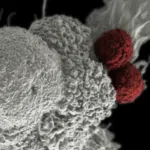Cell therapy utilizing chimeric antigen receptors (CARs) for immunotherapy of cancer show great promise as treatments of blood cancers.
CARs are composed of an antigen binding domain linked to a signaling domain, which collectively enables recognition of the cancer antigen and activation of the CAR-T cells. Therapeutically active CARs require high levels of antigen binding specificity, as well as optimal epitopes and affinity. The elements of the CAR— signaling domain, transmembrane domain, hinge, and antigen binding domain—must cooperate as one molecule with optimal therapeutic properties.
Single-chain variable fragments (scFvs), derived from an antigen-specific antibody, or single domain binders such as VHH antibodies (also known as NANOBODY®
molecules) are common sources of the antigen-binding domain in CARs. However, it can be impossible to predict the functionality of these formats without testing, as the original source is not always indicative of its characteristics once converted to a CAR.
Large functional data sets of monoclonal antibodies and VHHs are necessary to determine optimal lead CAR molecules, a challenge that we at Alloy address through our investments in high-throughput platforms. ATX-Gx™, our humanized mouse platform for monoclonal antibody discovery, as well as ATX-SiD, our platform in development for single domain antibody discovery, both generate highly diverse sets of binders against cancer antigens, representing the different epitopes and affinity levels required for optimal CAR selection.
Partners can run campaigns with our Antibody Discovery Services team to access high throughput CAR discovery and conversion enabling screening and ranking of binders in a relevant CAR format utilizing engineered cell lines and primary human immune cells. Partners will receive robust functional screening data sets including expression level, binding to the antigen, activation markers, cytokine release and cell killing. We also offer the option to screen combinatorial libraries of signaling domains and other components of the CAR constructs. While initially focused on T-cells for CAR-T screening, we have planned for expanded capabilities facilitating other cell types, such as natural killer (NK) cells and macrophages when needed.
Our work in cell therapy is driven by our conviction that the drug discovery community needs greater access to pre-competitive technologies to realize the benefits of next-generation therapeutic innovations. By pre-competitive, we mean technology that a variety of drug discovery organizations can use in parallel to discover drug candidates to advance through the clinic. The molecules selected by each organization are completely exclusive and proprietary IP, but the technology used to generate those molecules does not need to be.
Given most financial value comes from the final drug candidates, these pre-competitive platforms don’t typically receive as much funding and resources as biotech companies with drug pipelines do. Our commitment at Alloy to reinvest 100% of our revenue back into innovation and access to innovation enables us to develop these platforms for use by the global drug discovery community.
The challenge and promise of next-generation cell therapies are great enough that they need a wide community of scientists working on them to advance the best treatments possible for patients, and we are excited by the challenge of enabling that.
To learn more about starting a CAR discovery campaign with Alloy, connect with our business development team.






